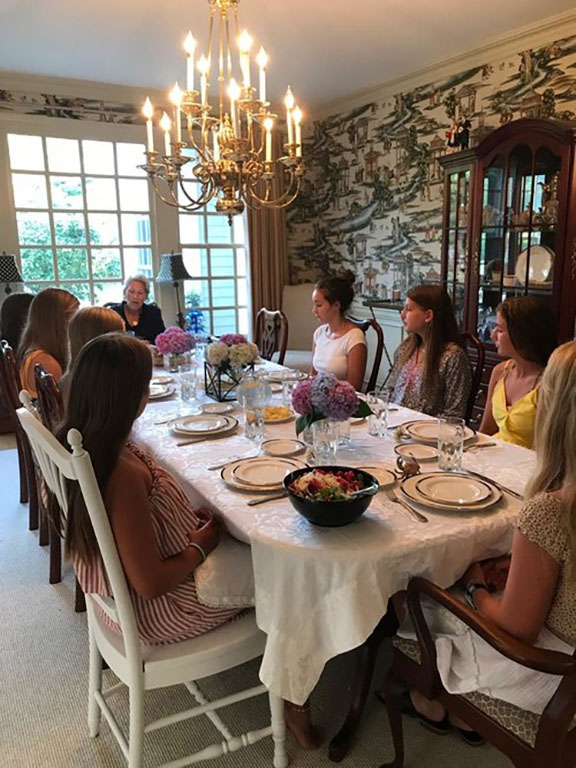Peeka Tildesley’s goal is to teach her students basic etiquette so they can gain confidence in all dining and social settings.
Photo courtesy American School of Protocol
By Judy O’Gorman Alvarez
Do your children know the proper rules of etiquette? Do they know the art of a firm handshake, the difference between a salad and a fish fork, or the significance of the dinner napkin?
Most youth – and adults – don’t know the answers. And if you find yourself in a situation where that information would help, you cannot quickly Google it because the No. 1 rule of etiquette is no cellphones at the table.
Peeka Tildesley, etiquette expert and founder of Politely Peeka Everyday Etiquette in Fair Haven, has been helping children and young adults learn how to behave in social situations and launch them into the world of business and a civilized life.
Reacting to the criticisms she has heard about how manners have deteriorated. Tildesley looked into sharing etiquette rules she has learned over the years. “I realize there’s no time anymore,” she said of most families’ busy schedules. “People are in their cars eating meals.”
But for Tildesley, “Sunday
night dinner is so important
for putting away the social
media and having the art of
conversation.”

Photo by Taylor McFarland
Politely Peeka Everyday Etiquette, is “etiquette with a flair.” Although she considered herself well-versed in the rules of etiquette, Tildesley headed to Atlanta to study and become certified at The American School of Protocol, which provides etiquette certification training to teach children and adults etiquette and social skills classes.
“I learned so much,” she said. “I learned how to become a better eater. I was rushing.”
In her training, Tildesley learned how to teach children how to eat a meal properly and how to engage in social action.
If there’s a secret to how to eat with etiquette, it would be a word that the original Miss Manners may not have used but proves true – mindfulness.
“It’s the art of slowing down, enjoying your meal – like the Italians and the French do,” Tildesley said.
“This new world of mindfulness, it all starts with setting the table nicely. Preparing your place setting is really the first start.”
And it’s not just about pretty dinnerware and proper utensils; most importantly it’s creating a welcoming place to sit down and dine.
The lessons she imparts are more than how to hold your silverware when cutting your food and where to rest your knife and fork when you’re finished eating.
Tildesley points out handling oneself in social situa- tions is like anything else – it may not come naturally and requires effort and practice. She equates etiquette with other endeavors, like learning to play tennis or piano.
Children need to learn etiquette skills in everyday life, she said. “It’s helpful if you have it come up naturally at the dinner table.”
“Etiquette is defined as expected behavior that shows respect and is meant to make everyone feel comfortable,” she said.
Among the table lessons she imparts: how to eat a sandwich properly and how to handle French fries (they should be cut); always pass to the right; the salt and pepper are married – don’t pass one without the other; the butter plate is called the trash can plate – that’s where you hide your discarded olive pit; and always break off each piece of bread and butter it separately instead of slathering the entire roll.
And then there’s the napkin: “The napkin starts the meal,” she said. When there’s a host, wait until he or she picks up the napkin then pick up yours and put it on your lap.
“You should fold it in half, the fold should be toward your waist,” That way, she points out, if you need to dab your mouth you can use the inside of the napkin.
But many people don’t know what to do with the napkin when they leave their seats.
Of course, good manners are not all about the food; it also covers handshaking, eye contact and being a good conversationalist.
Students learn the art of writing a thank you note – “It has to be done within three days – a week at most,” Tildesley said. “And email is not acceptable for a lovely gift.”
Families invite Tildesley to hold sessions in their homes for one or more students and provide meals. She asks that they be simple: two courses, usually a salad and the main meal.
Tildesley and her students set the table. “And we sit and talk. It might not be about etiquette. They learn about communication.”
She instructs students to come with 10 questions to initiate a conversation, the importance of remembering people’s names and hints on how to do that.
Every lesson is different. “There are no quizzes, just enjoy it,” she said. “If you take three things away you didn’t know, it would be great.”
And she covers the all-important topic the original etiquette expert Emily Post never had to contend with: no cellphones.
She asks the parents the rules of the home concerning cellphone etiquette. If there are no rules, she establishes them.
Put the cellphones away. “You have to be present when you’re with company, even when you approach the table.” You can always slip away to deal with important matters and then return.
A lifelong Monmouth County resident, Tildesley said when she was raising her son and daughter – now adults – she was not perfect. They often sat at the kitchen counter for meals. “If I could do it all over again I would have made an effort” to create a proper place setting. “The art of a place setting is so beautiful when it’s done correctly.”
Tildesley knows how busy schedules are. “I empathize with parents. It’s become so hard with activities and pressures and I understand what these kids are going through.”
But learning proper etiquette will help them in adulthood. “Otherwise, it’s going to be a disadvantage for 20-year olds when they go out for an interview in the world,” she said.
For young folks who are dining with a prospective employer or anyone they’d like to impress, she cautions: “Order something easy to eat. No spaghetti.”
When Jackie Santos and her daughter Brooke, a freshman at Rumson-Fair Haven Regional High School, invited eight school friends to their home for dinner and a lesson with Tildesley, they made it a fun, informal experience.
“I think learning proper manners are so important,” Santos said. “Especially the little things like making eye contact, a firm handshake. Those little lessons that get overlooked.”
She said the girls paid attention and seemed to enjoy learning with no distractions – cellphones were neatly tucked away.
“I think learning proper etiquette in manners and conversations is going to serve them well when they go out to the workplace and have dinners and lunches,” she said. “They don’t have to feel uncomfortable and they won’t feel out of place.”
And as Brooke and her etiquette-minded friends now know: When they leave the table mid-meal, they’ll leave their napkins loosely folded on their seats and never place the napkin back on the table while others are eating.
When done, they will leave it to the left of the plate, signaling the meal is over.














